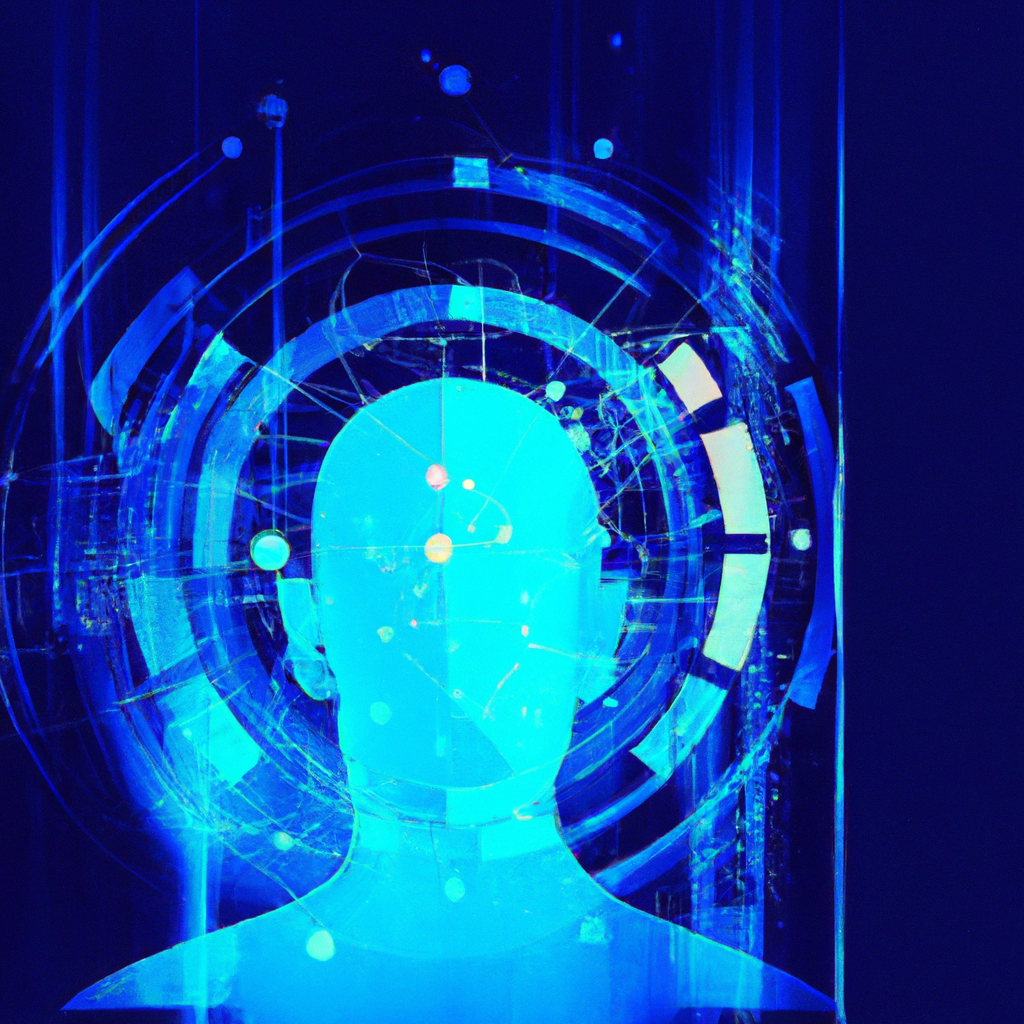Picture this: you’re scrolling through your social media feed, and amidst the sea of captivating ads, you stumble upon an incredibly compelling post that prompts you to make a purchase. As you marvel at the marketing genius behind it, a question pops into your mind: will artificial intelligence (AI) ever replace the work of a marketing specialist? In a world where technology continues to advance at breakneck speed, it’s natural to wonder if robots will one day take over this creative domain. Let’s explore this intriguing possibility together.

Role of AI in Marketing
Understanding AI
AI, or Artificial Intelligence, is a field of computer science that focuses on creating intelligent machines that can perform tasks that typically require human intelligence. These machines are designed to learn from data, recognize patterns, and make decisions with minimal human intervention. In the context of marketing, AI can be used to analyze large amounts of customer data, automate repetitive tasks, and make personalized recommendations. It has the potential to revolutionize the way marketers understand and engage with their target audience.
Advantages of AI in Marketing
AI brings numerous advantages to the field of marketing. Firstly, it enables marketers to analyze vast amounts of data at a speed and scale that would be impossible for humans alone. AI algorithms can uncover valuable insights and patterns within this data, helping marketers make informed decisions and tailor their strategies to specific customer segments.
Secondly, AI can automate repetitive tasks that consume a significant portion of a marketer’s time. Tasks such as data entry, report generation, and email marketing can be effectively managed by AI systems, freeing marketers to focus on more strategic and creative aspects of their work.
Furthermore, AI capabilities can significantly enhance decision-making in marketing. By leveraging machine learning algorithms, marketers can predict customer behavior, identify potential opportunities or risks, and optimize marketing campaigns based on real-time data. This not only saves time and resources but also improves the overall effectiveness and efficiency of marketing efforts.
Lastly, AI enables marketers to deliver personalized experiences at scale. By analyzing customer data and behavior, AI algorithms can generate personalized recommendations and targeted communications, which can greatly improve customer satisfaction and increase conversion rates.
Disadvantages of AI in Marketing
While AI presents many advantages in marketing, it also has its limitations and potential drawbacks. One major disadvantage is the lack of creativity that AI systems possess. Creative thinking, innovative strategies, and human touch are essential elements of marketing that are difficult to replicate with AI alone. While AI can analyze and generate insights from data, it often lacks the intuition and subjective understanding that human marketers bring to the table.
Another disadvantage is the inability of AI to fully emulate the human touch in marketing. Building genuine connections and understanding human emotions and motivations are crucial aspects of effective marketing. AI may struggle to capture the nuances and subtleties of human communication, impacting the authenticity of marketing efforts.
Additionally, AI algorithms may have blind spots and biases that can lead to unfair or unethical practices. If the data used to train AI models is biased or incomplete, it may result in discriminatory targeting, exclusion, or unequal opportunities. It is crucial for marketers to continuously monitor and address these biases to ensure their marketing efforts are fair and inclusive.
The Changing Landscape of Marketing
Shift in Customer Behavior
The landscape of marketing is constantly evolving, and one significant aspect of this change is the shift in customer behavior. With the proliferation of technology and connectivity, customers now have access to information and options like never before. They are increasingly empowered and expect personalized and relevant experiences from brands. Understanding and adapting to these changing customer behaviors is crucial for marketers to stay ahead in the competitive market.
Emerging Technologies in Marketing
Emerging technologies play a vital role in shaping the future of marketing. One such technology is AI, which is already being integrated into various marketing strategies. Apart from AI, technologies like big data analytics, augmented reality, virtual reality, and voice assistants are also transforming the marketing landscape. These technologies have the potential to enhance customer engagement, deliver immersive experiences, and provide valuable insights for marketers. Embracing and leveraging these emerging technologies is essential for staying competitive in the dynamic marketing landscape.
Potential Impact on Marketing Specialists
AI as a Tool for Efficiency
AI serves as a powerful tool for marketing specialists to improve efficiency in their work. With AI systems handling repetitive and time-consuming tasks, marketers have more time to focus on strategic decision-making and creative endeavors. By automating routine processes, AI enables marketing specialists to work more efficiently and effectively, leading to better results and productivity.
AI Automating Repetitive Tasks
Many marketing tasks involve repetitive actions such as data entry, report generation, and email marketing. These tasks not only consume valuable time but are also prone to errors. AI can automate these repetitive tasks, significantly reducing the time and effort required. This enables marketing specialists to allocate their time to more value-added activities such as analyzing insights, developing marketing strategies, and creating engaging content.
AI Enhancing Decision Making
AI can greatly enhance decision-making in marketing. By analyzing vast amounts of data, AI algorithms can generate valuable insights and predictive models that aid in making informed decisions. This data-driven decision-making approach can help marketing specialists optimize marketing campaigns, target the right audience, and allocate resources effectively. With AI as a complement to their expertise, marketing specialists can make smarter decisions based on real-time data and trends.
AI’s Role in Personalization
Personalization is a key aspect of modern marketing, and AI plays a significant role in achieving this at scale. By analyzing customer data, AI systems can generate personalized recommendations, tailor marketing messages, and create customized experiences for individual customers. This level of personalization can improve customer satisfaction, increase engagement, and drive higher conversion rates. Marketing specialists can leverage AI to deliver personalized experiences throughout the customer journey, enhancing their overall marketing strategies.
AI’s Effect on Job Market for Marketing Specialists
With the integration of AI in marketing, some concerns arise about the potential impact on the job market for marketing specialists. While it is true that certain routine tasks may be automated by AI, the role of marketing specialists is not likely to be completely replaced. Instead, the role is expected to evolve, with marketing specialists focusing more on strategic thinking, creativity, and human-centered aspects of marketing. AI can be seen as a complementary tool that enhances the capabilities of marketing specialists, enabling them to deliver better outcomes and drive meaningful connections with customers.

Limitations of AI in Marketing
Lack of Creativity
One of the main limitations of AI in marketing is its lack of creativity. While AI systems excel at analyzing data and generating insights, they struggle to replicate the creativity and innovative thinking that human marketers bring. Marketing often requires out-of-the-box ideas, intuitive thinking, and the ability to connect with emotions and aspirations. AI, at least for now, is limited in its ability to deliver this level of creative thinking.
Inability to Emulate Human Touch
Another limitation of AI in marketing is its inability to fully emulate the human touch. Building genuine connections, understanding human emotions, and empathizing with customers are crucial for effective marketing. AI, being an algorithm-driven technology, may struggle to capture the nuances and complexities of human interactions. This can impact the authenticity and effectiveness of marketing efforts, as customers often seek genuine experiences and interactions with brands.
Blind Spots and Biases in AI
AI algorithms operate based on the data they are trained on, and this can lead to blind spots and biases. If the data used to train an AI model is biased or incomplete, it may result in biased decision-making or discriminatory practices. For example, if an AI marketing system is trained on data that is predominantly from a certain demographic, it may inadvertently favor that demographic in its targeting and recommendations. Identifying and addressing these biases is crucial to ensure fairness and inclusivity in marketing practices.
AI and Marketing Collaboration
Humans and AI Working Together
The most promising future lies in the collaboration between humans and AI in the field of marketing. While AI can bring efficiency, data-driven insights, and personalization, human marketers bring creativity, critical thinking, and empathy. By combining the strengths of both humans and AI, marketers can create powerful marketing strategies that engage with customers on a deeper level while leveraging the efficiency and scalability of AI systems.
AI Augmenting Marketing Specialists
Rather than replacing marketing specialists, AI is more likely to augment their capabilities. By automating routine tasks, providing data-driven insights, and enabling personalized experiences, AI systems can enhance the work of marketing specialists. This augmentation allows marketing specialists to focus on higher-level tasks that require human creativity, intuition, and strategic thinking. The collaboration between AI and marketing specialists has the potential to drive innovation, improve customer experiences, and deliver better business outcomes.
The Future Outlook
Long-term Potential of AI in Marketing
The long-term potential of AI in marketing is vast. As AI technology continues to advance, it has the potential to revolutionize the way marketers understand customer behavior, create personalized experiences, and drive business growth. With the ability to analyze vast amounts of data in real-time, AI can provide marketers with actionable insights, predict customer behavior, and optimize marketing strategies for maximum impact. The future of AI in marketing holds the promise of delivering even more sophisticated and tailored experiences for customers, ultimately leading to higher customer satisfaction and brand loyalty.
Evolution of Marketing Specialist Roles
With the integration of AI in marketing, the roles of marketing specialists are expected to evolve. While routine tasks may be automated, marketing specialists will focus more on strategic thinking, creative ideation, and human-centered aspects of marketing. The ability to leverage AI tools, analyze data, and translate insights into creative marketing strategies will become essential skills for marketing specialists. Furthermore, marketing specialists will play a crucial role in monitoring and addressing potential biases, ensuring ethical and fair use of AI in marketing. The evolving roles of marketing specialists will require continuous upskilling and adaptation to the changing landscape of marketing.
Adapting to the AI Era
Upskilling and Continuous Learning
To thrive in the AI era, marketing specialists need to invest in upskilling and continuous learning. As AI technology evolves, marketing specialists should stay updated with the latest trends, tools, and techniques. This includes understanding AI capabilities, learning how to leverage AI tools, and acquiring data analysis skills. By continuously upgrading their skills and knowledge, marketing specialists can stay ahead in the field and effectively collaborate with AI systems to drive marketing success.
Embracing AI as a Marketing Specialist
Rather than viewing AI as a threat, marketing specialists should embrace AI as a valuable tool that enhances their capabilities. AI can take care of mundane tasks, enable data-driven decision-making, and deliver personalized experiences at scale. By embracing AI, marketing specialists can shift their focus to higher-value activities such as strategy development, creative thinking, and building meaningful connections with customers. Embracing AI as a marketing specialist will require curiosity, adaptability, and a growth mindset to capitalize on the opportunities presented by this technology.
Ethical Considerations
Data Privacy and Security
As AI in marketing relies on vast amounts of customer data, ensuring data privacy and security becomes crucial. Marketers need to be vigilant in protecting customer information, adhering to data protection regulations, and implementing robust security measures. Building trust with customers by being transparent about data usage and ensuring their information is handled responsibly is essential for maintaining a positive brand image and fostering long-term customer relationships.
Fairness and Transparency in AI
Addressing biases and ensuring fairness and transparency in AI systems is another ethical consideration for marketers. Biases in AI algorithms can inadvertently result in discriminatory practices or exclusion of certain groups. Marketers should actively monitor and mitigate biases in AI algorithms to ensure their marketing efforts are fair and inclusive. Being transparent about the use of AI in marketing, including how algorithms are trained and decisions are made, can help build trust with customers and mitigate concerns about AI ethics.
Conclusion
AI is revolutionizing the field of marketing, bringing unprecedented opportunities and challenges. While AI offers advantages such as data analysis, automation, personalization, and efficiency, it also has limitations in terms of creativity, human touch, and biases. Marketing specialists need to adapt, upskill, and embrace AI as a valuable tool that enhances their capabilities rather than replacing them. With the continuous evolution of AI technology, marketing specialists play a crucial role in harnessing its potential and ensuring ethical and effective use in marketing practices. By leveraging the strengths of both humans and AI, marketers can create impactful and customer-centric strategies that drive business growth in the AI era.
